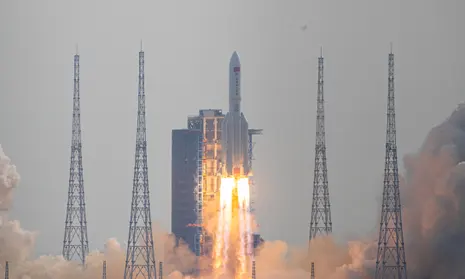- Airports in Barcelona and Ibiza were among those affected by the closure.
- The decision was made after China launched its potent Long March 5B rocket to deliver the Tiangong space station’s last module.
- Spain designated a 100 km (62 mi) wide exclusion zone as a safety measure.
Due to the dangers associated with a Chinese rocket reentering the atmosphere, Spain briefly closed off portions of its airspace.
Airports in Barcelona and Ibiza were among those disrupted by the Friday grounding, which lasted for about 40 minutes.
The choice was made after China launched its potent Long March 5B rocket to deliver the Tiangong space station’s last module.
Currently, a rocket fragment is reentering the atmosphere erratically.
It was anticipated that most of the residue would burn up as it descended.
However, there are some worries that portions of the debris, which the European Union Aviation Safety Agency has referred to as one of the largest objects to re-enter the atmosphere recently, may survive.
Property damage occurred in Ivory Coast in May 2020 as a result of the rocket’s first launch debris returning to Earth.
The European Union Space Surveillance and Tracking service has said on its website that the “statistical probability of an impact on the ground in populated areas is low”, with the remnant expected to land somewhere in the Atlantic Ocean.
However, it cautioned that northern Spain and Portugal, as well as southern Italy, were also in the debris’s path.
The national airspace administration of Spain designated a 100 km (62 mi) wide exclusion zone on either side of the orbit of the falling rocket as a safety measure.
The effect on flights is anticipated to last the entire day.
Nasa, the American space agency, has already requested that China design rockets that will shatter into smaller parts during re-entry, in accordance with international standards.
[embedpost slug=”chinese-rocket-debris-from-space-falls-back-to-earth/”]





















